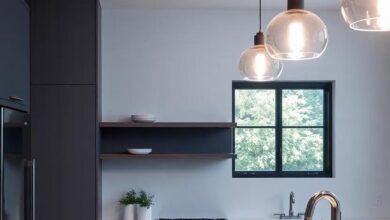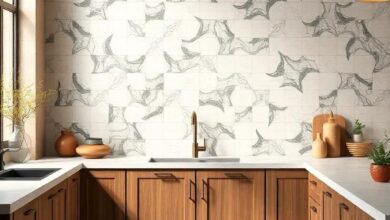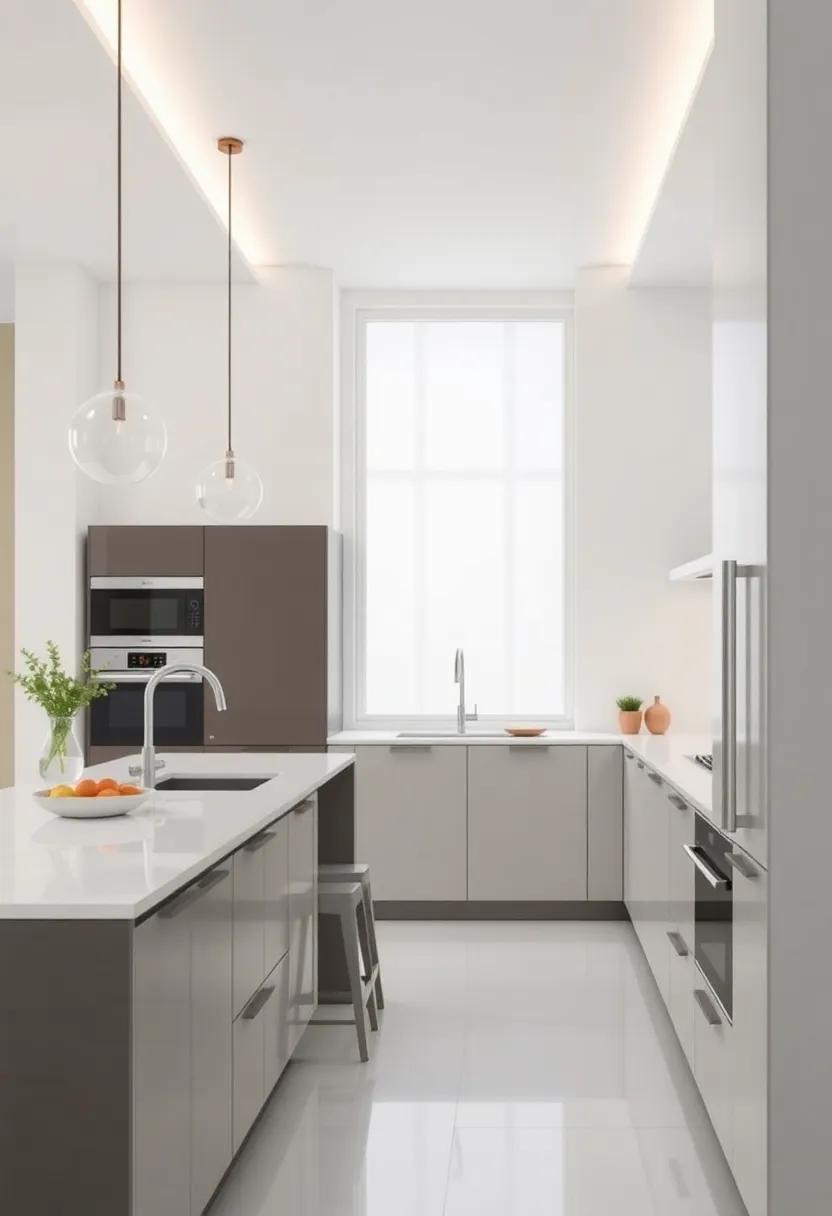
Transforming Spaces: The Art and Functionality of Modern Kitchen Design
In the heart of every home lies the kitchen—a space where culinary traditions blend with contemporary living, creating an surroundings that is both functional and inviting. As we step into the era of modern kitchen design, we witness a remarkable transformation that transcends mere aesthetics; it redefines the very essence of how we engage with our daily rituals. From innovative layouts to sustainable materials and cutting-edge technologies, today’s kitchens reflect a harmonious balance between art and functionality. This article explores the nuances of modern kitchen design, unveiling the critical elements that elevate a simple cooking space into a sanctuary of creativity, connection, and efficiency.Join us as we delve into the philosophy behind transforming spaces, and discover how thoughtful design can inspire both culinary mastery and cherished memories.
Revitalizing the Heart of the Home with Contemporary Kitchen Innovations

Modern kitchen design transcends mere aesthetics, merging style with groundbreaking functionality to create spaces that inspire culinary creativity. emphasizing seamless integration, today’s kitchens embrace smart technologies that enhance day-to-day tasks. From touchless faucets that conserve water to smart appliances that learn your cooking habits, these innovations bring unparalleled convenience. Homeowners can now enjoy features such as built-in recipe guidance and energy management systems,allowing them to engage with their culinary endeavors while minimizing their environmental impact.
The palette of contemporary kitchens reflects a shift toward sustainability and personalization. Rich, earthy tones, coupled with modern finishes like matte black and brushed brass, create an inviting atmosphere that is both chic and practical. Design elements such as open shelving and multifunctional islands foster a sense of community, encouraging family interaction and collaboration in meal preparation. Moreover, incorporating materials like reclaimed wood and recycled glass not only enhances the visual appeal but also aligns with eco-friendly principles, ensuring that every kitchen becomes a testament to intelligent design and sustainable living. For more insights, check out HGTV.
Balancing Aesthetics and Practicality in Modern Kitchen Spaces

In the quest for the ideal kitchen,homeowners frequently enough grapple with the delicate balance between aesthetics and practicality. A modern kitchen is more than just a functional space; it serves as the heart of the home, where style and efficiency converge.Incorporating sleek cabinetry and minimalistic countertops not only enhances the visual appeal but also streamlines day-to-day tasks. Strategically designed layouts can make use of open shelving and hidden storage, ensuring that utensils and appliances are both easily accessible and neatly organized, marrying beauty with usability.
Moreover, the selection of materials plays a pivotal role in this harmonious design. Natural elements such as wood or stone can evoke warmth and sophistication, while sustainable options provide a modern edge alongside environmental responsibility. Integrating smart technology further amplifies functionality, allowing for intuitive appliances that simplify meal prep and clean-up. by choosing versatile design elements like a central island—that serves as both a cooking space and a social hub—homeowners can create a kitchen that is as inviting as it is efficient. For more insights on modern kitchen trends, explore resources available at houzz.com.
Exploring Minimalism: Simplicity Meets Function in kitchen Design

Embracing minimalism in kitchen design goes beyond aesthetics; it creates an environment where functionality reigns supreme.simplified layouts eliminate clutter, allowing for seamless workflows that make cooking and entertaining a joy. Key principles of this design philosophy include:
- Decluttered Surfaces: Every item has a designated space, ensuring your countertops remain tidy and inviting.
- Neutral Color Palettes: Soft tones and natural materials evoke serenity,making cooking a calming experience.
- Smart Storage Solutions: Innovative cabinetry and built-in features help maximize space, keeping everything within reach without the mess.
Additionally, modern technology plays a significant role in enhancing the minimalist kitchen. From smart appliances to integrated devices, these advancements not only streamline cooking processes but also align with the minimalist ethos of practicality over excess.Consider incorporating:
- Touch-Control Faucets: Reduce the need for physical contact,maintaining cleanliness.
- Built-In Bluetooth Speakers: Enjoy music without compromising space or style.
- Induction Cooktops: efficient and sleek, they offer precise cooking control while maintaining a modern look.
The balance between form and function in kitchen design can be explored further at Architectural Digest.
Elevating Functionality: Smart Storage Solutions for Every Kitchen

In the quest for an organized and efficient kitchen,smart storage solutions are essential. Today’s designs emphasize the importance of maximizing every inch of space, offering innovative approaches to storage that cater to the modern homeowner’s needs. Incorporating features such as pull-out shelves, lazy Susans, and modular drawer systems can transform cluttered cabinets into accessible and visually appealing areas. Additionally, customizable solutions like open shelving can showcase your favorite cookware while keeping everything within reach, blending style with functionality.
Consider the benefits of hidden organizers; they bring a sense of order to your kitchen without compromising on aesthetic appeal. Options like under-sink drawers or corner cabinet pull-outs allow for efficient use of traditionally underutilized spaces. A well-designed kitchen can also include vertical storage like tall cabinets or wall-mounted racks, keeping essential items readily at hand. By embracing these approaches, homeowners can not only elevate the functionality of their kitchens but also create an environment that inspires culinary creativity. Learn more about effective kitchen solutions at houzz.com.
Lighting as a Design Element in Crafting Inviting Kitchen Environments

Lighting plays a pivotal role in the overall aesthetic and functionality of a kitchen, transforming it from a mere cooking space into a warm and inviting environment. By strategically layering ambient, task, and accent lighting, homeowners can craft an atmosphere that suits both culinary endeavors and social gatherings. Options such as pendant lights above an island or under-cabinet lighting not only illuminate workspaces but also create a cozy ambiance. Consider these benefits of effective kitchen lighting:
- Enhances visual appeal: A well-lit kitchen showcases design elements like backsplashes and cabinetry.
- Improves functionality: Proper task lighting reduces eyestrain during food preparation.
- Sets the mood: Dimmable options can create a relaxed atmosphere for entertaining.
Incorporating innovative lighting fixtures can further accentuate the unique style of the kitchen. Options such as LED strip lights, wich are easily adjustable, enable customization of light intensity while enhancing architectural features. Additionally, fixtures made from diverse materials—like brass or glass—can serve as eye-catching focal points in the design. Below is a simple table summarizing different types of lighting and their primary functions:
| Type of Lighting | Function |
|---|---|
| Ambient | General illumination |
| Task | Focused lighting for specific activities |
| Accent | Highlighting design elements |
For more inspiration on lighting in kitchen design, check out Houzz.
Incorporating Natural Materials for a Warm Kitchen Atmosphere

To create a kitchen that feels inviting and warm, incorporating natural materials is key. Opting for elements such as wood, stone, and ceramic can transform the room from a mere cooking space into a nurturing environment. Reclaimed wood cabinetry or open shelving can add richness and texture, while stone countertops introduce an earthy, grounded feel. Using ceramics—whether in the form of dishware or decorative tiles—brings a handcrafted touch that resonates with the organic aesthetics of nature.
In addition to aesthetics, the choice of materials can influence the overall functionality of the kitchen. Consider the following materials and their benefits:
- Bamboo: eco-friendly, durable, and adds a unique warmth.
- Slate: Perfect for flooring or countertops, offers a natural look and is highly functional.
- Terra Cotta: Ideal for backsplashes,infuses a Mediterranean feel.
Creating harmony between these materials can also elevate the kitchen’s charm. Many designers recommend incorporating a mix of textures,such as a sleek marble island paired with rustic wooden stools. For more design inspiration and tips, visit Architectural Digest.
The Role of Color Psychology in Contemporary Kitchen Interiors

The contemporary kitchen is not just a space for cooking; it’s a canvas where color plays a pivotal role in creating an ambiance that reflects personality and functionality. Every hue carries its own psychological weight,influencing moods and interactions within the home. Such as, soft blues are known to evoke tranquility, making them ideal for a calming cooking environment, while vibrant yellows can stimulate creativity and happiness, perfect for family gatherings and culinary experiments. Homeowners can experiment with accent colors through backsplash tiles, utensils, and cabinetry to achieve a striking balance that enhances both aesthetics and psychological well-being.
Moreover, the strategic use of color can also effect the perceived size and brightness of a kitchen. Lighter shades such as whites,creams,and pastels can make a small kitchen feel more expansive and open,while darker hues create intimacy and warmth. to maximize the effectiveness of color psychology in kitchen interiors, consider:
- Choosing a color palette that aligns with your personal style and lifestyle needs.
- Incorporating textures and materials that complement chosen colors for depth.
- Utilizing lighting to accentuate colors, enhancing mood and functionality.
In this way, color becomes more than just an aesthetic choice; it transforms kitchens into harmonious hubs that cater to both culinary endeavors and social interactions. For further inspiration, explore the Color Psychology website for a deeper understanding of how colors influence your living spaces.
Creating Open Spaces: The Trend of Seamless Kitchen-Living areas

As contemporary design trends shift towards open and airy environments, the integration of kitchen and living spaces has gained remarkable popularity. This seamless transition not only promotes a sense of unity but also enhances the functionality of the home. Key elements that contribute to this harmonious blend include:
- Flow and Accessibility: A well-designed kitchen-living area fosters easy movement and access, making multitasking effortless.
- Natural Light: Open layouts maximize sunlight, creating a vibrant atmosphere that uplifts mood and energy.
- Social Interaction: Cooking and entertaining become intertwined, allowing families and guests to engage without barriers.
The aesthetic appeal of these spaces cannot be overlooked.By carefully selecting materials and colors, homeowners can create a cohesive look that reflects their personal style. Incorporating elements such as:
| Material | Effect |
|---|---|
| Wood | warmth and coziness |
| Glass | Openness and transparency |
| Metal | Modern industrial charm |
With careful consideration of these factors, the modern kitchen can evolve into a central hub of home life, providing both practicality and style. For more insights into open-plan living, visit House Gorgeous.
Innovative Appliances: Merging Technology with Culinary Creativity

In today’s culinary landscape, the integration of smart technology into kitchen appliances is revolutionizing the way we cook and entertain. From multifunctional ovens that can be controlled via smartphone apps to refrigerators that suggest recipes based on the ingredients you have, innovative appliances are not merely tools but collaborators in the kitchen. Features such as automated cooking settings, self-cleaning functions, and energy efficiency monitoring have redefined convenience, making the cooking experience more enjoyable and efficient. Chefs can now focus on creativity rather than mundane tasks, as technology takes care of the precision, timing, and even food safety.
The aesthetic appeal of these devices has also evolved, allowing them to seamlessly blend into modern kitchen designs. options for sleek finishes, customizable panels, and integrated smart displays mean that functionality does not come at the cost of style. To illustrate this synergy of form and function,consider the following features that enhance both the usability and the visual allure of contemporary kitchens:
| Appliance Type | Key Feature | benefit |
|---|---|---|
| Smart Ovens | Voice Activation | Hands-free cooking experience |
| Smart Refrigerators | Inventory Management | Reduces food waste |
| Induction Cooktops | Speed and Efficiency | Faster cooking times |
| Dishwashers | Custom Wash Cycles | Saves energy and water |
These innovations not only enhance the functionality of the kitchen but also inspire culinary creativity,driving home the idea that technology and design can exist in harmony. With constant advancements in smart kitchen technology, the culinary possibilities are expanding rapidly, encouraging enthusiasts and professionals alike to explore new recipes and cooking techniques. Discover more about the latest trends in kitchen technology on Cooking light.
Sustainable Design Practices for the Eco-Conscious Kitchen

Crafting an environmentally friendly kitchen begins with the selection of materials that not only enhance aesthetic appeal but also promote sustainability. By opting for recycled materials, like reclaimed wood or repurposed glass, homeowners can significantly reduce their carbon footprint while adding charm to their space. Additionally, incorporating non-toxic finishes and sustainable paint reduces the release of harmful chemicals, creating a healthier environment for families. Key elements include:
- Low-VOC Cabinetry – Minimizes harmful emissions.
- Energy-efficient Appliances – Reduces electricity usage.
- Natural Fabrics – Utilizes organic cotton and linen for textiles.
Moreover, the implementation of water-efficient fixtures contributes to resource conservation in the kitchen. Installing aerated faucets and low-flow dishwashers can significantly decrease water use without sacrificing performance. It’s essential to create a workspace that flows naturally, promoting both functionality and eco-friendliness. To inspire this transformation, consider showcasing a simple comparison of conventional versus sustainable practices in modern kitchens:
| Aspect | Traditional Kitchen | Sustainable Kitchen |
|---|---|---|
| Material Selection | Newly sourced wood | Reclaimed or recycled materials |
| Appliance Efficiency | Standard efficiency | Energy Star rated |
| Water Use | Standard faucets | Low-flow fixtures |
creating a kitchen that respects the planet’s resources is not just a trend—it’s a necessity for future generations. To explore more sustainable options for interior design, visit Green Building Advisor.
The Importance of Ergonomics in Efficient Kitchen Layouts

Creating a kitchen that caters to both aesthetics and efficiency requires a deep understanding of ergonomic principles.An effective kitchen layout minimizes unnecessary movements and optimizes workflows, ensuring that tasks like cooking, cleaning, and food preparation are seamless experiences. Key elements that contribute to an ergonomic kitchen include:
- Work Triangle Optimization: Positioning the refrigerator, stove, and sink in a triangular configuration to reduce foot traffic and streamline movement.
- Adjustable Counter Heights: Incorporating surfaces that accommodate various tasks and user preferences promotes comfort and reduces strain.
- Strategic Storage Solutions: Ensuring frequently used items are within easy reach, preventing excessive bending or stretching.
Furthermore, considering the physical and cognitive needs of users can significantly enhance kitchen functionality.A well-considered layout can prevent fatigue and enhance productivity, making the space more intuitive to navigate. Using technology to enhance usability, such as lighting that adapts to different tasks or smart storage systems, can transform the kitchen into a haven of efficiency. A great resource for exploring more on this topic is www.ergonomics.org,which offers insights into creating spaces that prioritize user comfort and functionality.
Designing Multi-Functional spaces for Culinary and Social Gatherings

Creating a space that seamlessly blends culinary and social interactions requires a thoughtful approach to kitchen design. By emphasizing open layouts and versatile furniture, homeowners can cultivate an environment that accommodates both cooking and entertaining. Key elements might include multi-level islands that serve as cooking stations, dining areas, and casual hangouts, making it easy for guests to participate in the culinary experience. Incorporating flexible seating arrangements and mobile carts adds to the functionality, allowing the space to adapt based on the occasion, whether it’s a quiet family dinner or a lively gathering of friends.
Lighting plays an integral role in enhancing the atmosphere of these multifunctional spaces. By combining task lighting over work areas with ambient lighting for social gatherings, the kitchen can effortlessly transition from a workspace to a vibrant social hub. The use of natural materials, such as wood and stone, complements the aesthetics while making the space feel warm and inviting. For those looking to explore design ideas further, resources like Houzz offer a plethora of inspiration for modern kitchens that balance both style and functionality.
Artful Backsplashes: Adding Personality Through Tile and Texture

When it comes to modern kitchen design, the choice of backsplash can serve as a captivating focal point, infusing the space with individuality. Whether you lean towards bold geometric patterns or serene, nature-inspired hues, tiles can transform an ordinary wall into a canvas of creativity. Consider the use of textured surfaces that play with light and shadow. Such as,a combination of matte and glossy finishes can create depth,while 3D tiles add a tactile element that invites curiosity. Emphasizing colors that resonate with your overall theme can set the tone,making your kitchen not just functional but also a vibrant expression of your personal style.
In addition to aesthetics, the practicality of various materials should play a crucial role in your selection process. Here are a few options to consider for your artistic backsplash:
- Ceramic Tiles: Versatile and easy to clean, available in myriad designs.
- Glass Tiles: Reflective surfaces enhancing light and adding a contemporary flair.
- Natural Stone: Each piece tells a unique story with organic textures and rich colors.
- Penny Round Tiles: perfect for creating a whimsical, vintage vibe.
Incorporating these elements can elevate the visual narrative of your kitchen, allowing you to seamlessly blend functionality with flair. Artists and designers alike favor using backsplashes as a means to boldly express identity, showcasing how a well-chosen tile can do so much more than mere protection against spills. Discover more about the impact of unique designs at House Beautiful.
Inspiring Countertops: Materials That Marry Beauty and Utility
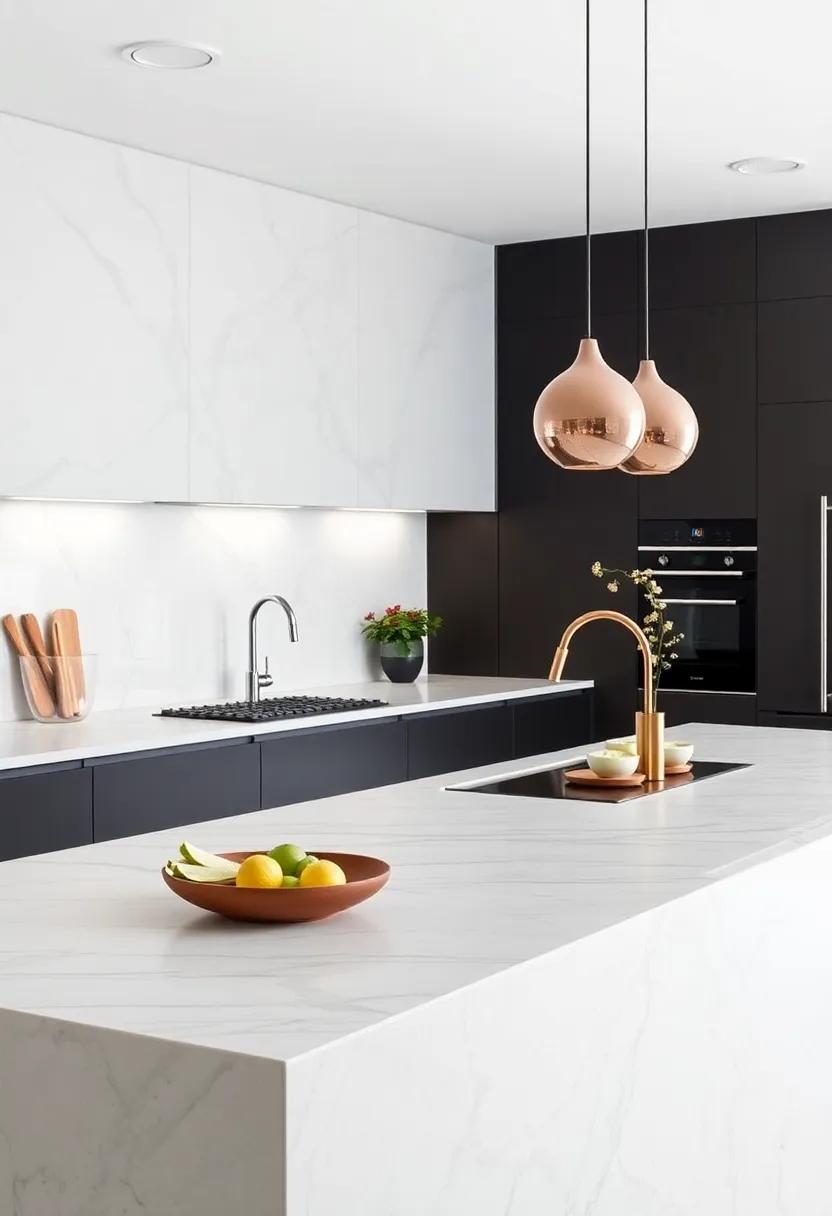
When it comes to modern kitchen design, the choice of countertop materials plays a crucial role in bridging the gap between aesthetics and functionality.natural stones like granite and marble exude timeless elegance, making them popular for their stunning visual appeal. Not only do they add a touch of luxury, but they are also incredibly durable and heat-resistant, which is essential for the hustle of daily cooking. On the other hand,materials like quartz – an engineered stone – offer a wide variety of colors and patterns that can accommodate any design theme,ensuring your kitchen remains uniquely yours. Additionally, surfaces like concrete and butcher block provide a more rustic charm while being practical for food preparation and daily use.
For those seeking a balance between eco-friendliness and sophistication, sustainable options such as recycled glass or bamboo countertops are worth considering. These materials not only enhance the beauty of your space but also tell a story of environmental responsibility and innovation. Laminate countertops, with their vast array of colors and textures, serve budget-conscious homeowners well without sacrificing style.When selecting materials, it’s vital to consider factors like maintenance, resistance to stains and scratches, and overall longevity. Together, these attributes culminate in countertops that truly embody the art of modern kitchen design. for further inspiration, visit Houzz to explore stunning kitchens.
Transformative islands: The Centerpiece of Modern Kitchen Design
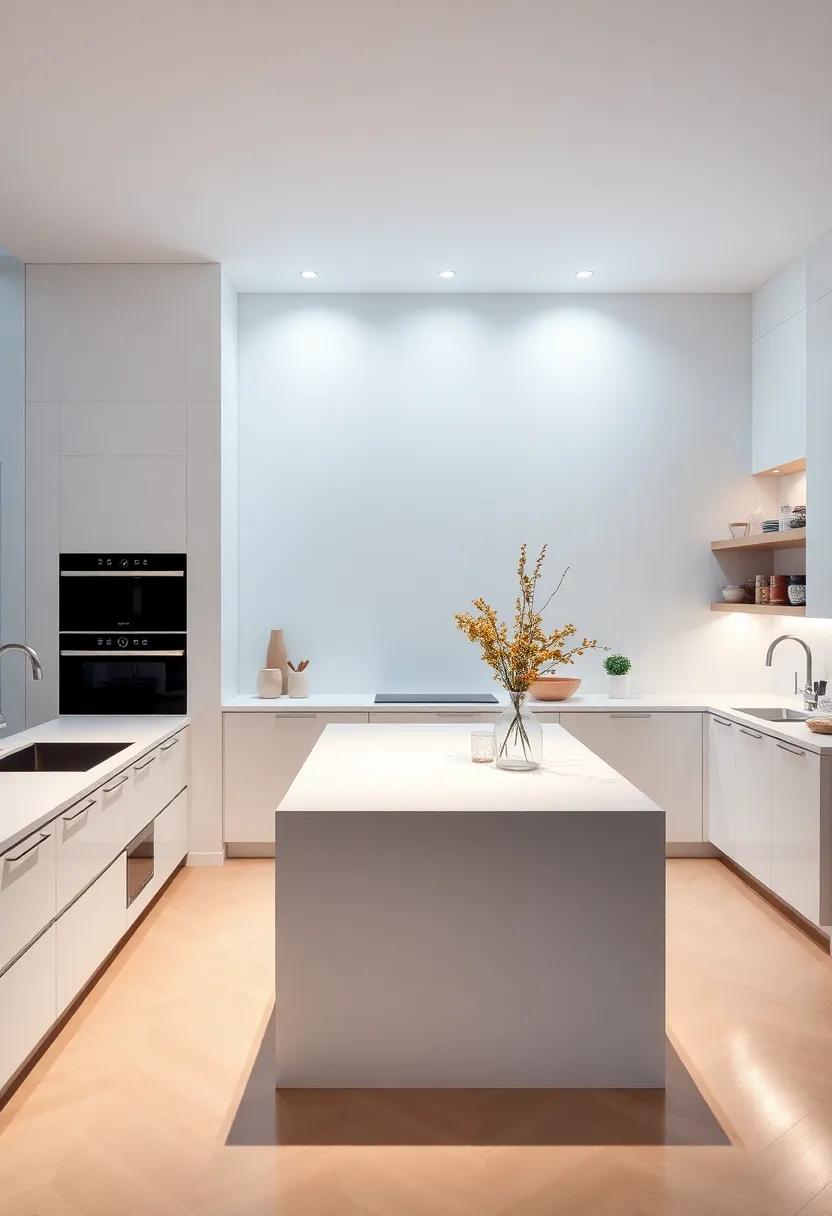
At the heart of contemporary kitchen design, islands have evolved beyond mere functionality to become dynamic focal points that redefine the culinary experience. These versatile structures serve multiple purposes—acting as prep stations, informal dining areas, or even a gathering space for family and friends. Their design can range from sleek, minimalist styles to more intricate, rustic aesthetics, bridging the gap between beauty and utility. Key features often include:
- Integrated Appliances: Refrigerators, dishwashers, and stovetops cleverly embedded within the island.
- Varied Heights: multi-level surfaces cater to different tasks and preferences.
- Storage Solutions: Cabinets and shelving for easy access to kitchen essentials.
The choice of materials also plays a crucial role in the island’s overall impact on kitchen design. From natural stone countertops to modern composite surfaces, each option contributes to the ambiance and functionality of the space. Whether opting for crisp whites and grays for a modern feel or rich woods for warmth, the island acts as a design statement that invites interaction. Not surprisingly, an increasing number of homeowners appreciate the aesthetic and functional benefits of a well-designed island, making it an indispensable element of their modern cooking space. For more inspiration on kitchen layouts and design concepts, check out Houzz.
Crafting Cohesion: Harmonizing Kitchen Design with Home Decor
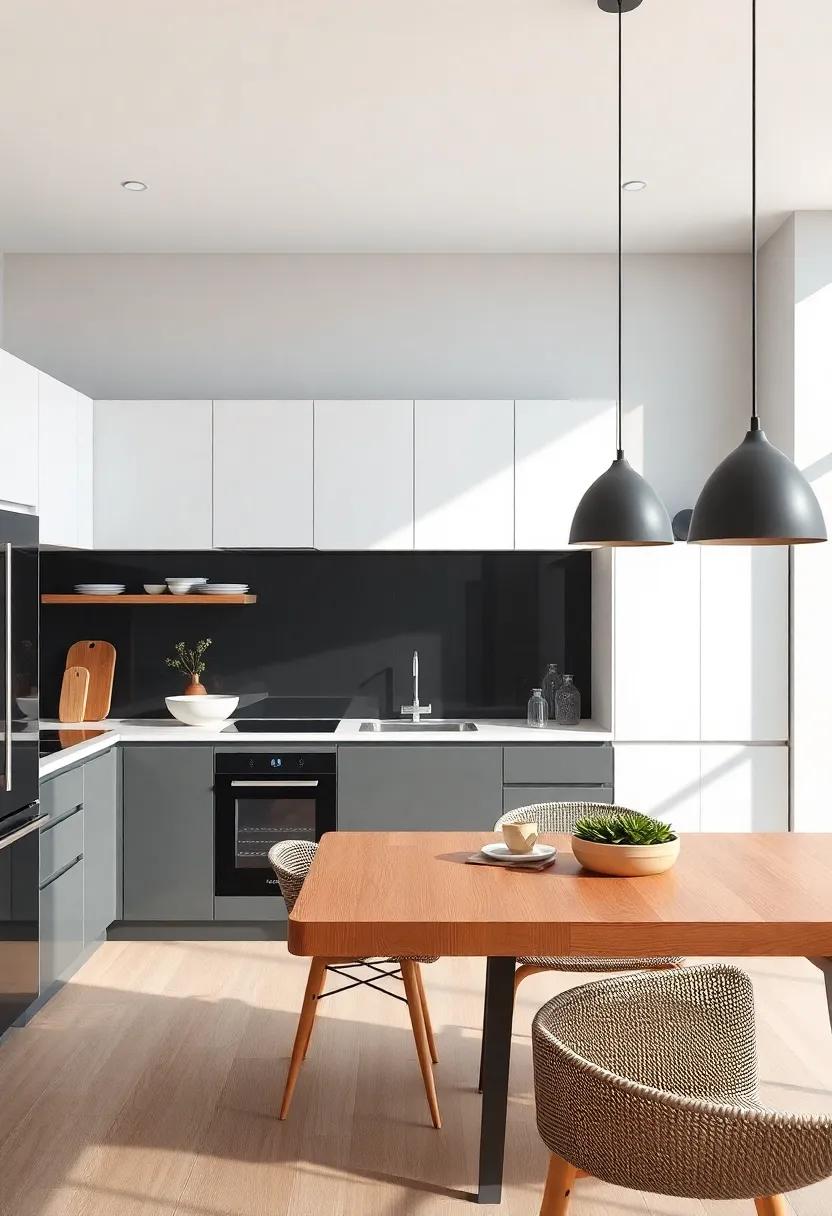
Creating a seamless blend between kitchen design and broader home decor involves an eye for detail and an understanding of how each element interacts. Colors, materials, and finishes should be chosen carefully to ensure that your kitchen flows effortlessly with adjacent living spaces. Think about the color palette you want to establish: warm,earthy tones can evoke a cozy atmosphere,while sleek whites and greys create a more modern aesthetic. Incorporate materials such as wood, metal, and stone that mirror your home’s overall design theme, providing visual ties between the kitchen and the surrounding areas.
Lighting plays a crucial role in achieving this harmony. Consider a mix of ambient, task, and accent lighting to emphasize features that connect your kitchen to the rest of the home. For example, decorative pendant lights can serve both as a functional light source and a striking design element, drawing attention to an island while reflecting the style of the adjoining living room. Utilizing decorative accents—like art, plants, and textiles—that resonate with your home’s style can further reinforce cohesion. In addition, a well-placed table or bar area can bridge the gap between the kitchen and entertaining spaces, promoting an inviting atmosphere for gatherings. For further insights into kitchen and home decor, check out House Beautiful.
Exploring the Role of Textiles in Kitchen Comfort and Style

Textiles play a pivotal role in shaping both the comfort and aesthetic of kitchen spaces, often being the unsung heroes of modern design. From luxurious curtains that frame windows with warmth, to vibrant table linens that infuse energy into dining areas, textiles elevate the kitchen experience in subtle yet impactful ways. The texture of these materials can create inviting atmospheres, encouraging family gatherings and culinary adventures. Key elements such as dish towels, aprons, and chair cushions not only serve practical purposes but also contribute to the overall design narrative, allowing homeowners to express their individual style.
When selecting textiles for the kitchen, consider a blend of functionality and design. Look for materials that are durable, easy to clean, and resistant to stains, such as cotton blends or synthetic fibers that mimic natural textures. Colors and patterns are equally crucial; vibrant hues can invigorate a neutral space, while soft tones can create a calm ambiance. To inspire your selections,below is a simple overview of textile choices:
| Textile Item | Function | Style Impact |
|---|---|---|
| Tablecloths | Protect surfaces and enhance meal presentations | Sets the mood for dining gatherings |
| Aprons | Protect clothing while cooking | Adds a touch of personality and flair |
| Dish Towels | Useful for drying and cleaning | Fun patterns can brighten the space |
incorporating these textural elements not only enhances the kitchen’s functionality but also enriches the overall atmosphere,making it a place where comfort reigns supreme and style is a constant presence. for more ideas on how to enhance your kitchen with textiles, visit Apartment Therapy.
Personalizing Your space: Infusing character into Kitchen Design

Creating a kitchen that reflects your personal taste requires a thoughtful approach to design that goes beyond mere functionality. Start by selecting a color palette that resonates with you, whether it’s soft pastels for a cozy atmosphere or vibrant hues for a lively space. Incorporating unique materials, such as reclaimed wood or colorful ceramics, can also add warmth and a personal touch. Custom cabinetry is a stellar way to blend style with individuality, allowing you to choose handles, finishes, and storage options that cater to your cooking habits and aesthetic preferences.
Accessorizing your kitchen is another chance to express your character. Consider a mix of decorative items, functional gadgets, and personal memorabilia to create a space that feels both lived-in and inviting. Here are some ideas to get you started:
- Display your favorite cookbooks on open shelves for easy access and decoration.
- Hang art that inspires you—whether it’s a beautiful food-inspired painting or custom prints reflective of your travels.
- Incorporate plants that not only add color but improve air quality.
By blending artistic elements with practical choices, your kitchen can transform into a functional haven that tells your unique story.For inspiration, check out Architectural Digest, which showcases innovative kitchen designs from around the globe.
Wrapping Up
As we draw the curtain on our exploration of modern kitchen design,it’s clear that this transformative space is much more than a place to prepare meals—it’s a canvas for creativity,a hub for connection,and a reflection of personal style. The seamless blend of art and functionality in today’s kitchens showcases how thoughtful design can enhance not just our culinary experiences, but also our daily lives.
Whether you’re reimagining your cooking space or embarking on a complete renovation, remember that every choice contributes to the narrative of your home. From innovative layout solutions to sustainable materials,the opportunities for personalization are boundless.As you embark on this journey, let your kitchen speak to your lifestyle and aspirations, embodying the perfect harmony of beauty and practicality.
In celebrating the art of modern kitchen design, we invite you to not only embrace change but to savor the joy of creating a space that feels uniquely yours. The kitchen might potentially be the heart of the home, but with a little inventiveness and intention, it can also become a masterpiece of daily living. So go forth, envision, and transform—your ideal kitchen awaits!
As an Amazon Associate I earn from qualifying purchases.


